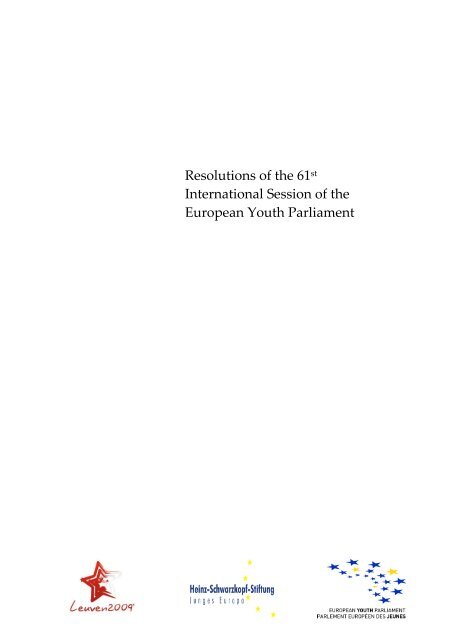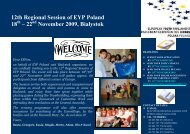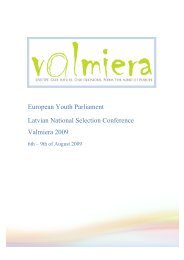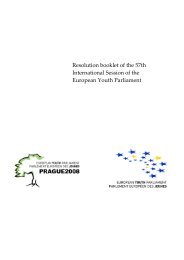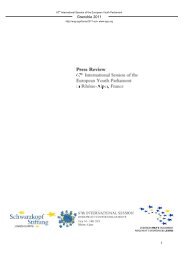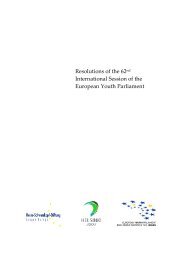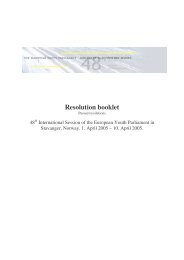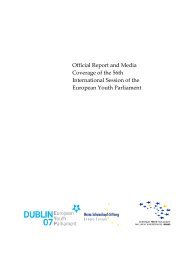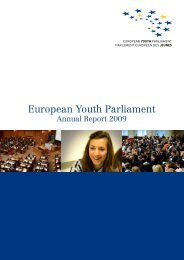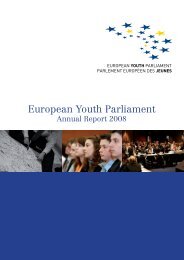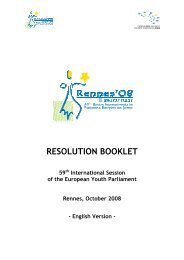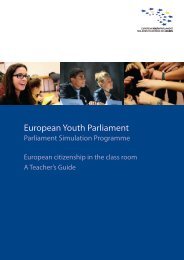Resolutions booklet in English - European Youth Parliament
Resolutions booklet in English - European Youth Parliament
Resolutions booklet in English - European Youth Parliament
Create successful ePaper yourself
Turn your PDF publications into a flip-book with our unique Google optimized e-Paper software.
<strong>Resolutions</strong> of the 61 st<br />
International Session of the<br />
<strong>European</strong> <strong>Youth</strong> <strong>Parliament</strong>
Under the High Patronage of<br />
Lodewijk De Witte, Bernard Caprasse and Louis Tobback<br />
RESOLUTION BOOKLET<br />
61 st International Session of the <strong>European</strong> <strong>Youth</strong><br />
<strong>Parliament</strong><br />
17 th – 26 th July, 2009
RESOLUTIONS PASSED BY THE 61 ST INTERNATIONAL SESSION OF<br />
THE EUROPEAN YOUTH PARLIAMENT<br />
- INCLUDED IN THIS BOOKLET -<br />
Resolution by the Committee on Foreign Affairs II<br />
Resolution by the Committee on Constitutional Affairs<br />
Resolution by the Committee on Women’s Rights and Gender Equality<br />
Resolution by the Committee on Civil Liberties, Justice and Home Affairs I<br />
Resolution by the Committee on Employment and Social Affairs<br />
Resolution by the Committee on Foreign Affairs I<br />
Resolution by the Committee on Environment, Public Health and Food Safety I<br />
Resolution by the Committee on Development<br />
Resolution by the Committee on Culture and Education II<br />
Resolution by the Committee on Human Rights I<br />
FAILED RESOLUTIONS AT THE 61 ST INTERNATIONAL SESSION OF THE<br />
EUROPEAN YOUTH PARLIAMENT<br />
Resolution by the Committee on Economic and Monetary Affairs<br />
Resolution by the Committee on Environment, Public Health and Food Safety II<br />
Resolution by the Committee on Civil Liberties, Justice and Home Affairs II<br />
Resolution by the Committee on Culture and Education I<br />
Resolution by the Committee on Human Rights II
MOTION FOR A RESOLUTION BY<br />
THE COMMITTEE ON FOREIGN AFFAIRS II<br />
Leuven, July 2009<br />
With the Taliban resurgent <strong>in</strong> Afghanistan and Pakistan on the br<strong>in</strong>k of collapse: how<br />
should the EU work with the <strong>in</strong>ternational community to prevent the further acceleration of<br />
<strong>in</strong>stability and security lapses <strong>in</strong> the AFPAK region?<br />
Submitted by: Rad<strong>in</strong>a Angelova (BG); Wim van Doorn (NL); Maria Krist<strong>in</strong>e Göthner (NO);<br />
Alexander Van Laer (BE); Steliana Moraru (RO); Lydia Ni Fhlo<strong>in</strong>n (IE);<br />
Pavlos Pachidis (GR); Matthew Pollock (GB); Angelica Richtner (SE); Davor<br />
Sišul (HR); Robert Siudak (PL); Rebecca Smith (FR); Laura Solenghi (IT);<br />
Eriks Varpahovskis (RU); Tornike Zurabashvili (GE); Oscar Schonfeld<br />
(Chairperson, UK)<br />
The <strong>European</strong> <strong>Youth</strong> <strong>Parliament</strong>,<br />
A. Guided by the fact that efforts to impose values, beliefs and <strong>in</strong>stitutions have failed numerous times <strong>in</strong><br />
the past <strong>in</strong> cases across the world,<br />
B. Not<strong>in</strong>g with concern the power of extremist groups <strong>in</strong> parts of the region and their ongo<strong>in</strong>g violent<br />
conflicts with the Pakistani military and International Security Assistance Force (ISAF):<br />
i) Have a severely destabilis<strong>in</strong>g effect on the region as a whole and <strong>in</strong> the arenas of conflict<br />
themselves,<br />
ii) Cause a humanitarian crisis through the generation of refugees <strong>in</strong> particular,<br />
iii) H<strong>in</strong>der economic development,<br />
C. Reaffirm<strong>in</strong>g the importance of the Pakistani military as a partner <strong>in</strong> the fight aga<strong>in</strong>st the Taliban and Al<br />
Qaeda <strong>in</strong> the Afghanistan-Pakistan (AFPAK) border region,<br />
D. Deeply disturbed that the AFPAK border region is home to extremist religious groups who have carried<br />
out and cont<strong>in</strong>ue to plan terrorist attacks aga<strong>in</strong>st Europe, India and the United States (US) amongst<br />
others,<br />
E. Tak<strong>in</strong>g <strong>in</strong>to account that civilian support for extremist religious groups <strong>in</strong> parts of the region encourages<br />
and facilitates their activities,<br />
F. Recognis<strong>in</strong>g that the ongo<strong>in</strong>g dispute between Afghanistan and Pakistan over the Durand L<strong>in</strong>e:<br />
i) Results <strong>in</strong> diplomatic tension between the two countries,<br />
ii) Contributes to a porous border which is susceptible to arms and drug smuggl<strong>in</strong>g,<br />
iii) Hampers coord<strong>in</strong>ation of the fight aga<strong>in</strong>st extremist religious groups <strong>in</strong> the border region,<br />
G. Conv<strong>in</strong>ced that Pakistan’s hard-l<strong>in</strong>e approach to separatist movements, such as <strong>in</strong> Pashtun populated<br />
areas and Baluchistan, contributes to cont<strong>in</strong>u<strong>in</strong>g <strong>in</strong>stability <strong>in</strong> such regions,<br />
H. Fully aware of the ongo<strong>in</strong>g use of so-called ‘good jihadis’ by the Pakistani military <strong>in</strong> the conflict aga<strong>in</strong>st<br />
India <strong>in</strong> Kashmir and aga<strong>in</strong>st separatist movements,<br />
I. Affirm<strong>in</strong>g that the EU cannot force a resolution to separatist disputes accord<strong>in</strong>g to its own judgement of<br />
the merits of the case,<br />
J. Greatly encouraged by the Pakistani and Indian jo<strong>in</strong>t statement of <strong>in</strong>tent (July 16 th 2009) agree<strong>in</strong>g to:<br />
i) Freeze the conflict <strong>in</strong> Kashmir,<br />
ii) Work together to combat terrorism <strong>in</strong> the AFPAK region,<br />
iii) Cooperate <strong>in</strong> the <strong>in</strong>vestigation of the Mumbai attacks,
K. Applaud<strong>in</strong>g EUPOL’s ongo<strong>in</strong>g work <strong>in</strong>:<br />
i) The implementation of anti-corruption strategy,<br />
ii) The development of the crim<strong>in</strong>al <strong>in</strong>vestigation service,<br />
iii) The advancement of <strong>in</strong>telligence based polic<strong>in</strong>g,<br />
iv) Co-operat<strong>in</strong>g with ISAF,<br />
v) Increas<strong>in</strong>g the police’s role <strong>in</strong> secur<strong>in</strong>g key cities such as Kabul and Kandahar,<br />
vi) Combat<strong>in</strong>g the drug trade,<br />
L. Express<strong>in</strong>g its disappo<strong>in</strong>tment about Member States’ failure to fulfil their stated commitments to the<br />
EUPOL force,<br />
M. Support<strong>in</strong>g the new less aggressive policy towards poppy production adopted by the US and the EU <strong>in</strong><br />
Afghanistan,<br />
N. Conv<strong>in</strong>ced that the development of alternative sources of livelihood is the long-term solution to poppy<br />
production,<br />
O. View<strong>in</strong>g with <strong>in</strong>creas<strong>in</strong>g approval the ongo<strong>in</strong>g development of <strong>in</strong>frastructure <strong>in</strong> Afghanistan,<br />
P. Concerned that education <strong>in</strong> the AFPAK region is not easily available for all,<br />
Q. Tak<strong>in</strong>g <strong>in</strong>to consideration that cultural, historical and religious customs which exist <strong>in</strong> parts of the region<br />
<strong>in</strong>hibit women’s education,<br />
R. Bear<strong>in</strong>g <strong>in</strong> m<strong>in</strong>d that highly educated women are required and culturally accepted <strong>in</strong> certa<strong>in</strong> types of<br />
employment such as midwifery,<br />
S. Believ<strong>in</strong>g that the development of the democratic process <strong>in</strong> Afghanistan is crucial to the country’s<br />
future;<br />
1. Prioritises soft power as the area for the EU’s major assistance to the AFPAK region by focus<strong>in</strong>g on:<br />
a) Development of civilian <strong>in</strong>stitutions <strong>in</strong> Afghanistan and the Pakistani border prov<strong>in</strong>ces,<br />
b) National reconstruction <strong>in</strong> Afghanistan;<br />
2. Believes that the EU should delegate decisions regard<strong>in</strong>g troop numbers to NATO and <strong>in</strong>dividual<br />
Member States;<br />
3. Encourages the cont<strong>in</strong>uation of close cooperation between the EU and the Pakistani military whilst<br />
engag<strong>in</strong>g with the newly established civilian adm<strong>in</strong>istration;<br />
4. Urges the EU to work towards alleviat<strong>in</strong>g the humanitarian and refugee problems caused by the<br />
conflict between extremist religious groups, the Pakistani military and ISAF through:<br />
a) Increas<strong>in</strong>g crisis aid provision,<br />
b) Send<strong>in</strong>g additional EU observers to ensure that the use of funds is as efficient as possible;<br />
5. Supports talks between Afghanistan and Pakistan aimed at settl<strong>in</strong>g the Durand l<strong>in</strong>e dispute through:<br />
a) Jo<strong>in</strong><strong>in</strong>g with other <strong>in</strong>ternational players <strong>in</strong> the region such as the US to put diplomatic<br />
pressure on Afghanistan and Pakistan to come to a resolution,<br />
b) Offer<strong>in</strong>g to play a mediat<strong>in</strong>g role <strong>in</strong> the negotiations;<br />
6. Suggests that the EU acts as a mediator <strong>in</strong> separatist conflicts if allowed to do so by parties to any<br />
potential negotiations;<br />
7. Cont<strong>in</strong>ues to work towards a warm<strong>in</strong>g of relations between Pakistan and India <strong>in</strong> order to end the<br />
perception with<strong>in</strong> Pakistan of be<strong>in</strong>g under constant threat from India;<br />
8. Requests that the EUPOL operation be:<br />
a) Expanded <strong>in</strong> terms of number of officers,
) Prolonged beyond its stated end date of 15 th June 2010;<br />
9. Calls for Member States to be compelled to follow through on their stated commitments to the<br />
EUPOL force;<br />
10. Proposes the <strong>in</strong>troduction of tax breaks for mult<strong>in</strong>ational companies’ <strong>European</strong> operations provided<br />
that these companies <strong>in</strong>vest <strong>in</strong> enterprises <strong>in</strong> Afghanistan;<br />
11. Seeks to assist the upgrad<strong>in</strong>g of Pakistan and Afghanistan’s f<strong>in</strong>ancial services sectors, through<br />
expertise-shar<strong>in</strong>g and f<strong>in</strong>ancial back<strong>in</strong>g, <strong>in</strong> order to <strong>in</strong>crease access to banks and microf<strong>in</strong>ance for the<br />
rural poor as well as small to medium sized enterprises;<br />
12. Declares that EU funded reconstruction <strong>in</strong> Afghanistan should be carried out us<strong>in</strong>g local contractors<br />
wherever possible;<br />
13. Designates a portion of local aid <strong>in</strong> Afghanistan to be positively l<strong>in</strong>ked to the level of school<br />
attendance <strong>in</strong> a given area;<br />
14. Suggests that <strong>in</strong> addition to exist<strong>in</strong>g development aid direct payments be made to families <strong>in</strong><br />
Afghanistan whose children attend school;<br />
15. Urges the EU to subsidise the foundation of vocational schools by the government of Afghanistan to<br />
provide practical skills for women on a level foot<strong>in</strong>g with men;<br />
16. Approves the EU observation mission for the upcom<strong>in</strong>g Afghan presidential election on 20 th August<br />
2009
MOTION FOR A RESOLUTION BY<br />
THE COMMITTEE ON CONSTITUTIONAL AFFAIRS<br />
Leuven, July 2009<br />
Fac<strong>in</strong>g political disengagement: What opportunities do newer forms of technology offer <strong>in</strong><br />
the challenge to widen democratic participation: How can the representatives of Europe do<br />
more to hear the voices of its citizens?<br />
Submitted by: Seyran Aliyev (UA); Mareike Bojer (DE); Mícheál Callaghan (IE); Daniel<br />
Danev (BG); Chrysanthi Karfi – Koi (GR); Mart<strong>in</strong> Kilp(EE); Floris Lauwers<br />
(BE); Teona Lavrelashvili (GE); Nemanja Predojevic (RS); Cristian Simion<br />
(RO); Estrella Waleson (NL); Sonja Pürckhauer (Chairperson, DE)<br />
The <strong>European</strong> <strong>Youth</strong> <strong>Parliament</strong>,<br />
A. Tak<strong>in</strong>g <strong>in</strong>to consideration the connection between the lack of <strong>European</strong> identity and the alarm<strong>in</strong>g drop <strong>in</strong><br />
the <strong>European</strong> <strong>Parliament</strong> election turnouts <strong>in</strong> June 2009,<br />
B. Concerned by the absence of a common <strong>European</strong> identity,<br />
C. Bear<strong>in</strong>g <strong>in</strong> m<strong>in</strong>d that the citizens of the EU share common historical backgrounds and values,<br />
D. Conv<strong>in</strong>ced that <strong>European</strong> identity should be developed and not imposed whilst not replac<strong>in</strong>g but<br />
supplement<strong>in</strong>g the national one,<br />
E. Aware that <strong>European</strong> identity can be achieved with both <strong>in</strong>put and output legitimacy,<br />
F. Realis<strong>in</strong>g the need to tighten the pre-exist<strong>in</strong>g bonds between the Member States <strong>in</strong> order to develop a<br />
<strong>European</strong> identity,<br />
G. Not<strong>in</strong>g with regret the difficulty <strong>in</strong> easily access<strong>in</strong>g unbiased <strong>in</strong>formation regard<strong>in</strong>g <strong>European</strong> <strong>in</strong>stitutions,<br />
H. Realis<strong>in</strong>g the potential of newer forms of technology <strong>in</strong> the challenge to widen democratic participation,<br />
I. Approv<strong>in</strong>g the <strong>European</strong> Ombudsman’s role as a successful <strong>in</strong>termediary between the representatives of<br />
Europe and its citizens,<br />
J. Recognis<strong>in</strong>g that <strong>in</strong>terest groups play an important role <strong>in</strong> widen<strong>in</strong>g democratic participation of citizens<br />
<strong>in</strong> the EU,<br />
K. Approv<strong>in</strong>g the possible implementation of the <strong>European</strong> Citizens’ Initiative, that would enable citizens to<br />
<strong>in</strong>fluence legislation <strong>in</strong> the EU, as proposed by the Lisbon Treaty;<br />
1. Introduces a unified vot<strong>in</strong>g system for the <strong>European</strong> <strong>Parliament</strong> elections that will provide all citizens<br />
with the possibility to vote for:<br />
a) A party list as a whole,<br />
b) An <strong>in</strong>dividual candidate with<strong>in</strong> a party or an <strong>in</strong>dependent candidate;<br />
2. Proclaims the acceptance of an e-vot<strong>in</strong>g procedure under the guidance of an EU watchdog<br />
organisation, which ensures security <strong>in</strong> the <strong>in</strong>ternet;<br />
3. Recommends national governments to <strong>in</strong>form their citizens about their civic duties by send<strong>in</strong>g<br />
<strong>in</strong>formation packs on vot<strong>in</strong>g procedures and EU <strong>in</strong>stitutions to first time voters;<br />
4. Supports live stream<strong>in</strong>g of all sessions of the <strong>European</strong> <strong>Parliament</strong> and its expansion to further EU<br />
<strong>in</strong>stitutions;<br />
5. Recommends the purchase of advertis<strong>in</strong>g space <strong>in</strong> major newspapers and their onl<strong>in</strong>e versions by the<br />
EU <strong>in</strong> order to <strong>in</strong>form citizens about <strong>European</strong> legislation and current <strong>European</strong> topics at a <strong>European</strong><br />
level;
6. Encourages the representatives of Europe to familiarise themselves with new technologies <strong>in</strong> order to<br />
reach out to voters;<br />
7. Recommends the facilitation of communication between MEPs and the electorate by the<br />
establishment of EU-wide “onl<strong>in</strong>e town halls”;<br />
8. Authorises an extension of the “<strong>European</strong> Citizens Consultation” programme which will:<br />
a) Take place <strong>in</strong> specially designed onl<strong>in</strong>e fora,<br />
b) Address contemporary issues,<br />
c) Consist of a certa<strong>in</strong> number of participants accord<strong>in</strong>g to each country’s population com<strong>in</strong>g<br />
from different social and economic backgrounds from all EU Member States,<br />
d) Operate on an ongo<strong>in</strong>g basis,<br />
e) Send the results of its discussions to the correspond<strong>in</strong>g EU commissioner;<br />
9. Urges EU officials to listen to the voices of its citizens for the legislation process by tak<strong>in</strong>g <strong>in</strong>to<br />
account the Eurobarometer polls;<br />
10. Calls upon all MEPs to:<br />
a) Arrange monthly visit<strong>in</strong>g hours at their local offices,<br />
b) Publicise the aforementioned visit<strong>in</strong>g hours,<br />
c) Hold open live-meet<strong>in</strong>gs on the <strong>in</strong>ternet for the public;<br />
11. Recommends the pan-<strong>European</strong> expansion of EU <strong>in</strong>formation offices to all Member States;<br />
12. Calls for the <strong>European</strong> <strong>in</strong>stitutions to further promote their already exist<strong>in</strong>g websites us<strong>in</strong>g version<br />
such as web 2.0 and web 3.0;<br />
13. Endorses the <strong>in</strong>clusion of <strong>European</strong> history courses to all Member States as a part of the school<br />
curriculum to foster an understand<strong>in</strong>g among young people;<br />
14. Approves the promotion of <strong>European</strong> political simulations and exchange programmes.
Leuven, July 2009<br />
MOTION FOR A RESOLUTION BY<br />
THE COMMITTEE ON WOMEN’S RIGHTS AND GENDER<br />
EQUALITY<br />
With rape, forced marriages and sexual harassment still present <strong>in</strong> Europe: what policies<br />
could better protect women aga<strong>in</strong>st violence <strong>in</strong> society?<br />
Submitted by: Faust<strong>in</strong>e Bidaud (FR); Jakob Fölster (DE); Patricia Garcia Guix (ES); Elsa<br />
Horn af Rantzien (SE); Andreia Hozhan (PT); Artemis Ioannides (GR);<br />
Semra Jakupi (MK); Rania Kourou (CY); Christiane Kraus (AT); Ciara<br />
McGrath (IE); Sebastiaan De Meue (BE); Tihomir Nedev (BG); Anneclaire<br />
van Not (NL); Giulia Pace (IT); Slawomir Pelczar (PL); Ruben Wagenaar<br />
(Chairperson, NL)<br />
The <strong>European</strong> <strong>Youth</strong> <strong>Parliament</strong>,<br />
A. Def<strong>in</strong><strong>in</strong>g violence aga<strong>in</strong>st women as occurr<strong>in</strong>g <strong>in</strong> their public or private lives and <strong>in</strong>volv<strong>in</strong>g:<br />
i) Female-directed violence which will or is likely to result <strong>in</strong> physical, sexual or psychological harm,<br />
ii) Threats of such actions,<br />
iii) Coercion,<br />
iv) The deprivation of liberty,<br />
B. Not<strong>in</strong>g with deep concern that approximately one <strong>in</strong> five women <strong>in</strong> Europe are victims of physical or<br />
sexual violence at least once <strong>in</strong> their lives,<br />
C. Bear<strong>in</strong>g <strong>in</strong> m<strong>in</strong>d the contribution of societal norms, religious dogmas and traditions, and biological<br />
differences to gender-<strong>in</strong>equality and violence aga<strong>in</strong>st women,<br />
D. Not<strong>in</strong>g with concern that violence aga<strong>in</strong>st women, <strong>in</strong> addition to the human suffer<strong>in</strong>g it causes, has a<br />
negative effect on society, <strong>in</strong>clud<strong>in</strong>g high costs for the health sector, social services, the police and the<br />
judiciary,<br />
E. Alarmed by the fact that cases of violence aga<strong>in</strong>st women often rema<strong>in</strong> unreported,<br />
F. Tak<strong>in</strong>g note of the difficulties <strong>in</strong> collect<strong>in</strong>g data relevant to violence aga<strong>in</strong>st women and compar<strong>in</strong>g this<br />
data between Member States,<br />
G. Aware of the social stigma concern<strong>in</strong>g violence aga<strong>in</strong>st women,<br />
H. Def<strong>in</strong><strong>in</strong>g forced marriage as marriage without the genu<strong>in</strong>e consent of both parties,<br />
I. Not<strong>in</strong>g that forced marriages cannot be easily identified because official consent is given even when<br />
genu<strong>in</strong>e consent is not,<br />
J. View<strong>in</strong>g with appreciation the Daphne III programme (2007-2013) aimed at:<br />
i) Rais<strong>in</strong>g awareness with<strong>in</strong> the EU,<br />
ii) Provid<strong>in</strong>g support to Non Governmental Organisations and other organisations aimed at<br />
combat<strong>in</strong>g violence aga<strong>in</strong>st women,<br />
K. Not<strong>in</strong>g with satisfaction that eradicat<strong>in</strong>g all forms of gender-based violence is a ma<strong>in</strong> priority of the<br />
“Roadmap for equality between women and men 2006-2010”,<br />
L. Welcom<strong>in</strong>g the request for a ‘<strong>European</strong> Year on Zero Tolerance of Violence Aga<strong>in</strong>st Women’ by the<br />
<strong>European</strong> <strong>Parliament</strong>,<br />
M. Not<strong>in</strong>g with appreciation resolution 2008/2071/(INI) on combat<strong>in</strong>g female mutilation <strong>in</strong> the EU,<br />
N. Recognis<strong>in</strong>g the need for cont<strong>in</strong>ued improvement of support for victims of violence aga<strong>in</strong>st women;
1. Draws attention to the need for a pan-<strong>European</strong> def<strong>in</strong>ition of gender-based violence to be established<br />
as a basis for mak<strong>in</strong>g legislation perta<strong>in</strong><strong>in</strong>g to violence aga<strong>in</strong>st women more uniform;<br />
2. Urges Member States to <strong>in</strong>troduce lessons about perceived gender roles and stereotypes as well as the<br />
social phenomenon of violence aga<strong>in</strong>st women <strong>in</strong>to the compulsory primary and secondary school<br />
curriculum;<br />
3. Calls for the establishment of a media campaign with <strong>in</strong>formation concern<strong>in</strong>g potential risks and<br />
dangers of violence aga<strong>in</strong>st women, means of protection, and available support for victims and their<br />
families;<br />
4. Requests that Member States adopt a standardised method of collect<strong>in</strong>g data on gender-based<br />
violence;<br />
5. Recommends that the legal age of marital consent regardless of parental consent be set at eighteen by<br />
all Member States;<br />
6. Suggests that the <strong>European</strong> Year on Zero Tolerance of Violence Aga<strong>in</strong>st Women be focused on:<br />
a) Rais<strong>in</strong>g public awareness,<br />
b) Combat<strong>in</strong>g social stigma,<br />
c) Facilitat<strong>in</strong>g the <strong>in</strong>volvement of men and young people <strong>in</strong> the Year’s programme,<br />
d) Encourag<strong>in</strong>g <strong>in</strong>creased cooperation between Member States;<br />
7. Encourages the cont<strong>in</strong>uation of the Daphne programme beyond 2013;<br />
8. Calls upon Member States to designate a percentage of their budget to support the eradication of<br />
violence aga<strong>in</strong>st women;<br />
9. Strongly recommends that Member States provide tra<strong>in</strong><strong>in</strong>g to public servants <strong>in</strong>volved with victims of<br />
gender-based violence <strong>in</strong> order to help them best support these victims and promote gender-equality<br />
<strong>in</strong> their professions.
Leuven, July 2009<br />
MOTION FOR A RESOLUTION BY<br />
THE COMMITTEE ON CIVIL LIBERTIES, JUSTICE AND HOME<br />
AFFAIRS I<br />
Integration or assimilation? With several <strong>European</strong> countries recently <strong>in</strong>troduc<strong>in</strong>g<br />
citizenship trajectories and tests, which model for immigrant <strong>in</strong>tegration should Europe<br />
adopt <strong>in</strong> an <strong>in</strong>creas<strong>in</strong>gly multicultural society?<br />
Submitted by: Federico Biondi (IT); Malika Bouazzaoui (FR); Erik Burton (NO); Afra Pujol<br />
Campeny (ES); Anil Eryilmaz (TR); Mary Golden (IR); Anastasiya Kot (UA);<br />
Paul<strong>in</strong>a Lushaku (AL); Jonathan Maerker (SE); Hanna Oll<strong>in</strong>en (FI); Stavros<br />
Pagonidis (GR); Frances Pimenta (PT); Aleksander Pudlowski (PL); Anna<br />
Ursu (RU); Jakob Van Wassenhove (BE); Philip Danielsson (Chairperson,<br />
SE)<br />
The <strong>European</strong> <strong>Youth</strong> <strong>Parliament</strong>,<br />
A. Observ<strong>in</strong>g the need for <strong>in</strong>creased cooperation with<strong>in</strong> the EU regard<strong>in</strong>g immigration and <strong>in</strong>tegration<br />
policies,<br />
B. Recognis<strong>in</strong>g the importance of the Common Basic Pr<strong>in</strong>ciples (CBP) on immigration policy agreed upon<br />
by the <strong>European</strong> Council <strong>in</strong> Brussels 2004,<br />
C. Express<strong>in</strong>g hope for <strong>in</strong>creased mutual respect between immigrants and the EU citizens,<br />
D. Fully believ<strong>in</strong>g that multiculturalism does not pose a threat to the national identity of host countries,<br />
E. Affirm<strong>in</strong>g that <strong>in</strong>tercultural dialogue is essential for an effective <strong>in</strong>tegration process,<br />
F. Concerned that assimilation can lead to segregation, frustration and violence caus<strong>in</strong>g people to change<br />
their cultural identity and heritage,<br />
G. Deeply concerned by stereotypes towards immigrants employed <strong>in</strong> low-paid jobs or liv<strong>in</strong>g of social<br />
welfare,<br />
H. Not<strong>in</strong>g with regret the legislation <strong>in</strong> some Member States bann<strong>in</strong>g religious practises and traditions,<br />
I. Alarmed by the <strong>in</strong>creased number of hate crimes aga<strong>in</strong>st immigrants,<br />
J. Not<strong>in</strong>g with deep concern the spread of Islamophobia, Racism and Xenophobia across Europe,<br />
K. Not<strong>in</strong>g with approval the pr<strong>in</strong>cipal of us<strong>in</strong>g citizenship tests,<br />
L. Confident <strong>in</strong> each Member State’s ability to evaluate immigrants apply<strong>in</strong>g for citizenship,<br />
M. Tak<strong>in</strong>g <strong>in</strong>to account the difficult f<strong>in</strong>ancial situation of many recent immigrants <strong>in</strong>to the host country,<br />
N. Bear<strong>in</strong>g <strong>in</strong> m<strong>in</strong>d that demographic decl<strong>in</strong>e <strong>in</strong> the EU will eventually lead to a lack of labour force,<br />
O. Confident that recognis<strong>in</strong>g immigrants’ skills helps them <strong>in</strong>tegrate <strong>in</strong>to the labour market,<br />
P. Aware of the fact that the f<strong>in</strong>ancial crisis makes <strong>in</strong>tegration difficult due to <strong>in</strong>creased tension <strong>in</strong> the labour<br />
market caus<strong>in</strong>g social conflicts,<br />
Q. Emphasis<strong>in</strong>g the need to facilitate the access to essential public <strong>in</strong>stitutions for resident immigrants such<br />
as Healthcare System, Educational System and Legal Expert Assistance;<br />
1. Supports the creation of a common <strong>European</strong> network of <strong>in</strong>formation for immigrants supervised by a<br />
<strong>European</strong> Commission Directorate with the purpose of expla<strong>in</strong><strong>in</strong>g rights and legislation, us<strong>in</strong>g means<br />
such as but not limited to brochures, help l<strong>in</strong>es and counsell<strong>in</strong>g websites;
2. Endorses the promotion of <strong>in</strong>ternational literature <strong>in</strong> schools, universities and libraries especially<br />
related to local m<strong>in</strong>orities;<br />
3. Calls upon the EU Member States to promote multiculturalism <strong>in</strong> state media both concern<strong>in</strong>g<br />
presentation and content with particular regard to children’s media;<br />
4. Urges the reallocation of funds from the <strong>European</strong> Integration Fund (EIF) for the creation and<br />
ma<strong>in</strong>tenance of multicultural centres, whose activities <strong>in</strong>clude:<br />
5. The organis<strong>in</strong>g of cultural events such as festivals promot<strong>in</strong>g immigrants’ cultures,<br />
6. The organis<strong>in</strong>g of community level exchanges between immigrants and current <strong>in</strong>habitants so as to<br />
enable the shar<strong>in</strong>g of cultural practises and languages,<br />
7. The establishment of social assistance programmes for immigrants <strong>in</strong> need;<br />
8. Endorses anti-racism media campaigns, particularly those rais<strong>in</strong>g awareness of racially-related violence<br />
and crime;<br />
9. Strongly recommends Member States not to legislate aga<strong>in</strong>st religious and traditional practises whilst<br />
accept<strong>in</strong>g the primacy of the <strong>European</strong> Convention for Human Rights (ECHR);<br />
10. Recommends the <strong>in</strong>troduction of citizenship tests that require basic knowledge of language, culture<br />
and law consist<strong>in</strong>g of an EU-wide and a nationally specific section;<br />
11. Encourages EU Member States governments to provide the citizenship test and optional citizenship<br />
test preparation courses on a pay back system <strong>in</strong> which immigrants pay the government back after<br />
obta<strong>in</strong><strong>in</strong>g citizenship, with a possibility of partial subsidies;<br />
12. Further recommends that all immigrants apply<strong>in</strong>g for citizenship should be obliged to pass the<br />
citizenship test, except immigrants com<strong>in</strong>g through the Family Reunification Act (FRA) and are<br />
economically dependent on an EU citizen family member;<br />
13. Further requests that all immigrants who come through the FRA and are economically dependent on<br />
an EU citizen family member should be obliged to take the citizenship test preparation course;<br />
14. Calls upon EU Member States to provide vocational programs for immigrants fac<strong>in</strong>g employability<br />
difficulties with:<br />
15. L<strong>in</strong>ks to official <strong>in</strong>tegration mechanisms (e.g. citizenship trajectories),<br />
16. Regard to facilitated cooperation between the programmes and relevant employers;<br />
17. Requests a system of easier recognition of qualifications ga<strong>in</strong>ed <strong>in</strong> a non-EU country.
Leuven, July 2009<br />
MOTION FOR A RESOLUTION BY<br />
THE COMMITTEE ON EMPLOYMENT AND SOCIAL AFFAIRS<br />
With Europe fac<strong>in</strong>g great recession and high unemployment <strong>in</strong> the wake of the economic<br />
and f<strong>in</strong>ancial crisis: how should <strong>European</strong> states encourage economic growth whilst<br />
achiev<strong>in</strong>g social cohesion?<br />
Submitted by: Aida Arosoaie (RO); Burak Başoğul (TR); Veronika Drzková (CZ); Gustav<br />
Forssell (SE); Kev<strong>in</strong> Hartwell (FR); Pyry Helkkula (FI); Ilias Masouras (GR);<br />
Eimear O’Carroll (IE); Afrola Plaku (IT); Yavor Popov (BG); Ekater<strong>in</strong>a<br />
Sushchevskaya (RU); Katarzyna Uchman (PL); Panayiotis Votsis (CY); Iuliia<br />
Zemlytska (UA); Emre Tekişalp (Chairperson, TR)<br />
The <strong>European</strong> <strong>Youth</strong> <strong>Parliament</strong>,<br />
A. Disturbed by the ris<strong>in</strong>g unemployment rate that is projected by the EU Commission Economic<br />
Prognosis to reach an average of 11% by 2010 for the EU27,<br />
B. Recognis<strong>in</strong>g the ever-chang<strong>in</strong>g nature of the labour market due to rapid technological advancement<br />
lead<strong>in</strong>g to deficit of skilled workers,<br />
C. Not<strong>in</strong>g with deep concern the lack of work experience amongst graduates of <strong>in</strong>stitutions of higher<br />
education enter<strong>in</strong>g the labour market,<br />
D. Tak<strong>in</strong>g <strong>in</strong>to consideration that it is <strong>in</strong>evitable and necessary for certa<strong>in</strong> skills of workers to become<br />
redundant <strong>in</strong> order to achieve economic growth,<br />
E. Emphasis<strong>in</strong>g the need for <strong>in</strong>creased geographical and occupational workforce mobility,<br />
F. Not<strong>in</strong>g with deep regret the current stra<strong>in</strong> on the provision of social welfare due to the deteriorat<strong>in</strong>g<br />
economic situation,<br />
G. Aware of the current tendencies to implement protectionist policies with<strong>in</strong> Member States,<br />
H. Alarmed by the decrease <strong>in</strong> <strong>in</strong>vestment and trade due to the economic and f<strong>in</strong>ancial crisis,<br />
I. Bear<strong>in</strong>g <strong>in</strong> m<strong>in</strong>d the relative stability of household consumption expenditure <strong>in</strong> comparison with<br />
<strong>in</strong>vestment and trade,<br />
J. Stress<strong>in</strong>g the distrust between f<strong>in</strong>ancial <strong>in</strong>stitutions and consumers, result<strong>in</strong>g <strong>in</strong> decl<strong>in</strong><strong>in</strong>g liquidity <strong>in</strong> turn<br />
limit<strong>in</strong>g <strong>in</strong>vestment prospects,<br />
K. Emphasis<strong>in</strong>g the importance of the bank<strong>in</strong>g system <strong>in</strong> ma<strong>in</strong>ta<strong>in</strong><strong>in</strong>g the vitality of the economy,<br />
L. Observ<strong>in</strong>g the recent bank bailouts by Member States, result<strong>in</strong>g <strong>in</strong> dim<strong>in</strong>ished public confidence <strong>in</strong> the<br />
bank<strong>in</strong>g sector,<br />
M. Conscious of the fact that the annual <strong>in</strong>flation rate <strong>in</strong> the Euro area is currently at - 0.1%,<br />
N. Tak<strong>in</strong>g <strong>in</strong>to consideration the disparities between EU countries with regards to unemployment rates, tax<br />
rates and social welfare spend<strong>in</strong>g,<br />
O. Welcom<strong>in</strong>g the proposal of ‘Shared Commitment for Employment’ by the EU Commission focus<strong>in</strong>g on:<br />
i) Creat<strong>in</strong>g apprenticeship opportunities for more than 5 million young people across Europe,<br />
ii) Redirect<strong>in</strong>g 19 billion Euros to the <strong>European</strong> Social Fund (ESF) that is devoted to promote<br />
employment and retra<strong>in</strong><strong>in</strong>g opportunities <strong>in</strong> the EU,<br />
iii) Reallocat<strong>in</strong>g 100 million Euros towards the creation of a new microcredit facility;
1. Urges all Member States to <strong>in</strong>vest <strong>in</strong> occupational tra<strong>in</strong><strong>in</strong>g, retra<strong>in</strong><strong>in</strong>g and apprenticeships <strong>in</strong> order to<br />
produce a flexible, multi skilled workforce;<br />
2. Encourages universities to further facilitate voluntary work placements where relevant, <strong>in</strong> tandem with<br />
the regular academic programme;<br />
3. Calls for the immediate implementation of the ‘match and map’ service which will provide a pan-<br />
<strong>European</strong> database of job vacancies for the unemployed, tak<strong>in</strong>g <strong>in</strong>to consideration their skills and<br />
geographic location;<br />
4. Invites <strong>in</strong>creased government spend<strong>in</strong>g <strong>in</strong>to social welfare, healthcare and education;<br />
5. Condemns the use of any further protectionist policies <strong>in</strong> order to strengthen the s<strong>in</strong>gle market;<br />
6. Endorses the <strong>in</strong>troduction of tax <strong>in</strong>centives for start-up companies <strong>in</strong> their <strong>in</strong>itial years of trad<strong>in</strong>g;<br />
7. Requests the further provision of micro-credit loans for Small and Medium Enterprises (SME) and<br />
entrepreneurs;<br />
8. Emphasizes the need for further <strong>in</strong>vestment <strong>in</strong> the Information and Communication Technologies<br />
(ICT) sector and Research and Development (R&D);<br />
9. Deplores the use of government funds to bail out bankrupt companies;<br />
10. Recommends regular monitor<strong>in</strong>g of the bank<strong>in</strong>g sector to measure the level of high risk debt <strong>in</strong> the<br />
system <strong>in</strong> order to achieve f<strong>in</strong>ancial credibility;<br />
11. Proposes the establishment of a pan-<strong>European</strong> <strong>in</strong>surance fund to be:<br />
a) Funded by mandatory premiums paid by all <strong>European</strong> banks,<br />
b) Available to bail out banks <strong>in</strong> times of f<strong>in</strong>ancial crisis;<br />
12. Suggests that the <strong>European</strong> Central Bank (ECB) adjusts required reserve ratios accord<strong>in</strong>g to the needs<br />
of <strong>in</strong>dividual Member States;<br />
13. Supports an <strong>in</strong>crease <strong>in</strong> the number of repurchase agreements aimed at recapitalization between<br />
companies and the ECB;<br />
14. Considers that the ECB should further reduce its <strong>in</strong>terest rates whilst <strong>in</strong>flation levels rema<strong>in</strong> low;<br />
15. Approves of the ECB’s policy of recapitalisation of banks.
MOTION FOR A RESOLUTION BY<br />
THE COMMITTEE ON FOREIGN AFFAIRS I<br />
Leuven, July 2009<br />
Given recent signals for engagement with Europe from the Belarusian regime, what can be<br />
done to welcome the cont<strong>in</strong>ent’s ‘last dictatorship’ <strong>in</strong>to the diplomatic fold? Or how should<br />
Europe work with the cont<strong>in</strong>ents ‘last dictatorship’ <strong>in</strong> light of recent calls to thaw cold<br />
relations?<br />
Submitted by: Frans Beerkens (NL); Valeriia Cherednichenko (UA); Lavrentia<br />
Christodoulou (GR); Marie Dromey (IE); Laszlo Gulacsi (RO); Arno Janssen<br />
(BE); Sandro Jupalakiani (GE); Jorge Simelio Jurado (ES); Noora Piilola (FI);<br />
Remi Rivoal (FR); Lea Schiewer (DE); Konrad Staeger (CH); Bartosz Stós<br />
(PL); Eni Zylyftari (AL); Ceyda Erten (Chairperson, TR)<br />
The <strong>European</strong> <strong>Youth</strong> <strong>Parliament</strong>,<br />
A. Guided by the <strong>in</strong>tention of the EU to welcome Belarus <strong>in</strong>to a community which stands for values such as<br />
human rights, the rule of law and free market,<br />
B. Not<strong>in</strong>g with approval that the EU visa ban placed upon high rank<strong>in</strong>g Belarusian officials has been lifted<br />
until December 2009,<br />
C. Support<strong>in</strong>g Belarus’ decision not to recognise Georgia’s two breakaway regions Abkhazia and South<br />
Ossetia,<br />
D. Not<strong>in</strong>g with appreciation that Belarusian authorities released four political prisoners <strong>in</strong> August 2008,<br />
E. Deeply concerned by:<br />
i) The arrests of those support<strong>in</strong>g democracy <strong>in</strong> opposition to the state,<br />
ii) The unsolved cases of disappeared persons,<br />
F. Alarmed by the fact that despite Belarus be<strong>in</strong>g a member of the Organisation for Security and<br />
Cooperation <strong>in</strong> Europe (OSCE), the most recent elections <strong>in</strong> September 2008 were not held <strong>in</strong> a fully<br />
transparent way,<br />
G. Disturbed by the fact that Belarus rema<strong>in</strong>s the only country <strong>in</strong> Europe that exercises the death penalty,<br />
H. Recognis<strong>in</strong>g that Belarus is not <strong>in</strong>cluded <strong>in</strong> the <strong>European</strong> Neighbourhood Policy (ENP) which, through<br />
fund<strong>in</strong>g, aims at strengthen<strong>in</strong>g the prosperity, stability and security of the EU and its neighbours,<br />
I. Welcom<strong>in</strong>g Belarus’ participation <strong>in</strong> the Eastern Partnership (EaP) which aims at further strengthen<strong>in</strong>g of<br />
the relationship between the EU and six post-Soviet countries - Armenia, Azerbaijan, Belarus, Georgia,<br />
Moldova and Ukra<strong>in</strong>e,<br />
J. Bear<strong>in</strong>g <strong>in</strong> m<strong>in</strong>d that Belarus does not fully benefit from the EaP,<br />
K. Understand<strong>in</strong>g that the Belarusian economy is not competitive, efficient or modernised,<br />
L. Not<strong>in</strong>g that stable relations between Belarus and Russia have been jeopardised as a consequence of<br />
disagreements concern<strong>in</strong>g political and economic matters,<br />
M. Not<strong>in</strong>g with deep concern that censorship <strong>in</strong> Belarus results <strong>in</strong> limited media freedom and a lack of<br />
unbiased public awareness regard<strong>in</strong>g the state of affairs <strong>in</strong> Belarus,<br />
N. Not<strong>in</strong>g with regret that the authoritarian regime restricts the formation and action of non-governmental<br />
organisations (NGOs), consequently restrict<strong>in</strong>g freedom of speech and the right to assembly,<br />
O. Acknowledg<strong>in</strong>g with regret that Belarusian youth has limited access to youth organisations and exchange<br />
programmes across Europe,
P. Not<strong>in</strong>g with approval that the Council of Europe opened an <strong>European</strong> <strong>in</strong>formation centre <strong>in</strong> M<strong>in</strong>sk <strong>in</strong><br />
2009;<br />
1. Proposes all sanctions placed upon Belarusian officials by the EU to be lifted <strong>in</strong>def<strong>in</strong>itely <strong>in</strong><br />
accordance with future to progress by the Belarusian government;<br />
2. Calls for:<br />
a) The prevention of further political imprisonment,<br />
b) Jo<strong>in</strong>t EU-Belarus <strong>in</strong>vestigation <strong>in</strong>to the cases of disappeared persons;<br />
3. Urges the allowance of unrestricted access of <strong>in</strong>dependent observers dur<strong>in</strong>g the election process;<br />
4. Demands the establishment of a moratorium on death penalty;<br />
5. Strongly requests that the Belarusian authorities respect democratic values and human rights <strong>in</strong> order<br />
to ga<strong>in</strong> access to the benefits provided by the ENP such as economic <strong>in</strong>tegration, improved market<br />
access, f<strong>in</strong>ancial and technical aid as well as facilitation of visa issuance;<br />
6. Expects Belarus to make vast improvements regard<strong>in</strong>g human rights <strong>in</strong> order to actively participate <strong>in</strong><br />
the EaP;<br />
7. Calls for greater ease of access to the <strong>European</strong> market for Belarusian goods;<br />
8. Supports the improvement of conditions for foreign <strong>in</strong>vestment by engag<strong>in</strong>g foreign companies with<br />
the Belarusian market;<br />
9. Proposes organis<strong>in</strong>g an <strong>in</strong>ternational conference on <strong>in</strong>vest<strong>in</strong>g <strong>in</strong> Belarus gather<strong>in</strong>g private <strong>in</strong>vestors<br />
and Belarusian state representatives;<br />
10. Emphasises that stronger relations between Europe and Belarus would allow Europe to act as a<br />
reliable partner to Belarus;<br />
11. Notes that a healthier relationship between Russia and Belarus would be mutually beneficial;<br />
12. Requests Belarusian authorities:<br />
a) Give media full access to the available distribution networks,<br />
b) Remove restrictions for foreign media to operate with<strong>in</strong> and distribute to Belarus,<br />
c) Simplify media registration procedures,<br />
d) Allow citizens to access the different forms of media without the <strong>in</strong>terference of the<br />
government;<br />
13. Calls upon Europe to f<strong>in</strong>ancially support Belarusian NGOs through programs such as the <strong>European</strong><br />
Initiative for Democracy and Human Rights (EIDHR);<br />
14. Further requests the Belarusian government allow the registration of <strong>in</strong>dependent NGOs;<br />
15. Calls for Belarusian authorities to remove any punitive restrictions on participation <strong>in</strong> youth activities;<br />
16. Urges Europe to provide Belarus with more access to educational funds and additional <strong>in</strong>formation on<br />
youth organisations and exchange programmes;<br />
17. Encourages the Council of Europe to open new <strong>in</strong>formation po<strong>in</strong>ts across the country thus allow<strong>in</strong>g<br />
Belarus to participate more <strong>in</strong> the activities of the Council of Europe.
Leuven, July 2009<br />
MOTION FOR A RESOLUTION BY<br />
THE COMMITTEE ON ENVIRONMENT, PUBLIC HEALTH AND<br />
FOOD SAFETY I<br />
Smok<strong>in</strong>g bans and alcohol restrictions: protection of citizens or imp<strong>in</strong>gement on <strong>in</strong>dividual<br />
rights? To what extent does the state have a role to educate and protect its citizens’ health<br />
and what strategy should it adopt?<br />
Submitted by: Ioana Laura Alecsiu (RO); Monica Ileana Dobre (AT); Melissa Forss (FI);<br />
Ariadne Frangi (BE); Monika Kachlik (CZ); Eugene Korotaev (RU);<br />
Snezh<strong>in</strong>a Mar<strong>in</strong>ova (BG); Nikolas Mavreas (CY); Antonia Proka (GR);<br />
Viktoriia Pustynikova (UA); Magdalena Swider (PL); Božidar Nikša Tarabic<br />
(HR); Saale Tartes (EE); Marta Valls (ES); Len Veenker (NL); Eleni<br />
Aristodemou (Chairperson, CY)<br />
The <strong>European</strong> <strong>Youth</strong> <strong>Parliament</strong>,<br />
A. Fully aware that tobacco usage and alcohol abuse cause severe health problems,<br />
B. Recognis<strong>in</strong>g <strong>in</strong>dividuals’ freedom of choice concern<strong>in</strong>g the consumption of alcohol and use of tobacco<br />
products,<br />
C. Affirm<strong>in</strong>g the right of all citizens to enjoyment of the highest obta<strong>in</strong>able standard of health,<br />
D. Deeply conscious of the consequences of second hand smok<strong>in</strong>g on public health,<br />
E. Alarmed by the fact that tobacco rema<strong>in</strong>s the number one avoidable cause of death <strong>in</strong> Europe,<br />
F. Observ<strong>in</strong>g the <strong>in</strong>crease <strong>in</strong> the usage of alternative forms of tobacco products such as snuff,<br />
G. Welcom<strong>in</strong>g Portugal’s decision to decrim<strong>in</strong>alise drug use as a means of combat<strong>in</strong>g the abuse of drugs,<br />
H. Believ<strong>in</strong>g that if cigarette sales fall the reduction <strong>in</strong> government tax revenue associated would be offset by<br />
the decrease <strong>in</strong> healthcare expenditure,<br />
I. Not<strong>in</strong>g the social and economic costs alcohol abuse imposes on society,<br />
J. Alarmed by the fact that Europe is the cont<strong>in</strong>ent with the highest consumption of alcohol per capita <strong>in</strong><br />
the world,<br />
K. Deeply concerned with the ris<strong>in</strong>g problems surround<strong>in</strong>g alcohol abuse and its consequences, such as<br />
underage dr<strong>in</strong>k<strong>in</strong>g, excessive dr<strong>in</strong>k<strong>in</strong>g and dr<strong>in</strong>k driv<strong>in</strong>g,<br />
L. Bear<strong>in</strong>g <strong>in</strong> m<strong>in</strong>d the differences <strong>in</strong> cultural norms regard<strong>in</strong>g smok<strong>in</strong>g and alcohol consumption between<br />
Member States,<br />
M. Tak<strong>in</strong>g <strong>in</strong>to consideration that dr<strong>in</strong>k<strong>in</strong>g habits vary accord<strong>in</strong>g to age and gender, requir<strong>in</strong>g different<br />
approaches to tackle the problems related to alcohol abuse;<br />
1. Calls for a total ban on smok<strong>in</strong>g <strong>in</strong> enclosed public places, with the exception of offices equipped with<br />
specially designed smok<strong>in</strong>g rooms;<br />
2. Urges Member States to extend exist<strong>in</strong>g anti-smok<strong>in</strong>g campaigns to ensure that non-smokers are fully<br />
aware of the potential damage to their health from second hand smoke;<br />
3. Supports the work of Non Governmental Organisations (NGOs), the World Health Organisation<br />
(WHO) and EU programmes such as HELP and Euro-Bob <strong>in</strong> campaign<strong>in</strong>g aga<strong>in</strong>st smok<strong>in</strong>g and<br />
dr<strong>in</strong>k-driv<strong>in</strong>g;<br />
4. Calls upon the <strong>European</strong> Commission to draft updated proposals for:
a) A total ban of tobacco product advertis<strong>in</strong>g,<br />
b) A prohibition of advertis<strong>in</strong>g alcoholic products on television;<br />
5. Endorses the pan-<strong>European</strong> <strong>in</strong>troduction of warn<strong>in</strong>g labels on alcoholic dr<strong>in</strong>ks;<br />
6. Encourages the establishment and the organisation of more alcohol-free venues and events;<br />
7. Calls for an <strong>in</strong>crease <strong>in</strong> f<strong>in</strong>ancial support of rehabilitation programmes for addicts;<br />
8. Recommends the <strong>in</strong>troduction of measures to reduce the accessibility of tobacco and alcohol products<br />
<strong>in</strong>clud<strong>in</strong>g:<br />
9. The removal of such products from vend<strong>in</strong>g mach<strong>in</strong>es,<br />
10. Tighter restrictions on purchas<strong>in</strong>g hours;<br />
11. Further recommends an <strong>in</strong>crease <strong>in</strong> the frequency of <strong>in</strong>spections of shops and clubs <strong>in</strong>vestigat<strong>in</strong>g cases<br />
of sale of products to under-aged <strong>in</strong>dividuals to ensure that ID checks are carried out.
MOTION FOR A RESOLUTION BY<br />
THE COMMITTEE ON DEVELOPMENT<br />
Leuven, July 2009<br />
Bit<strong>in</strong>g the bullet: After decades of <strong>European</strong> development aid to sub-Saharan Africa, how<br />
should Europe ref<strong>in</strong>e its objectives and priorities? Is the current economic crisis a black<br />
cloud with a silver l<strong>in</strong><strong>in</strong>g when it comes to the future of <strong>in</strong>ternational development?<br />
Submitted by: George Barnes (GB); Alison Connolly (IE); Aude Durand (FR); Justus<br />
Goettemann (DE); Mart<strong>in</strong> Haba (CZ); David Hemmi (CH); Dirk Anton<br />
Janssen (NL); Dora Katar<strong>in</strong>a Jericevic (HR); Julia Khurchakova (UA); Aniol<br />
Quer (ES); Ivel<strong>in</strong>a Slavova (BG); Maria Tandeck (PL); Inger Brunvatne<br />
Thommessen (NO); Spiros Zafiris (GR); Helya Houshmand (Chairperson,<br />
SE)<br />
The <strong>European</strong> <strong>Youth</strong> <strong>Parliament</strong>,<br />
A. Tak<strong>in</strong>g <strong>in</strong>to account that Africa consists of 53 countries with 900 million <strong>in</strong>habitants yet has a GDP that<br />
accounts for only 1.78% of world Gross Domestic Product (GDP),<br />
B. Alarmed by the fact that the current economic crisis has h<strong>in</strong>dered sub-Saharan development, decreas<strong>in</strong>g<br />
growth from 6.9% <strong>in</strong> 2007 to 2.4% <strong>in</strong> 2009, lead<strong>in</strong>g to a significant drop <strong>in</strong> private and foreign direct<br />
<strong>in</strong>vestment,<br />
C. Reaffirm<strong>in</strong>g that the many basic prerequisites that are needed for African development outl<strong>in</strong>ed <strong>in</strong> the<br />
Millennium Development Goals (MDGs) (e.g. basic education, <strong>in</strong>frastructure, nutrition, clean water and<br />
health care), should be the primary goals of our development policies,<br />
D. Realis<strong>in</strong>g that geographical factors have a sizeable effect on development,<br />
E. Bear<strong>in</strong>g <strong>in</strong> m<strong>in</strong>d that the already disadvantageous circumstances (e.g. demographic growth, extreme<br />
poverty, diseases, unemployment, debt, years of conflict) <strong>in</strong> Africa have been further aggravated by the<br />
current economic crisis,<br />
F. Believ<strong>in</strong>g that the current economic crisis is an opportunity for the EU to focus aid more effectively<br />
rather than spend<strong>in</strong>g valuable funds on <strong>in</strong>efficient aid strategies,<br />
G. Not<strong>in</strong>g with deep concern that development aid does not always reach its target due to lack of<br />
transparency and traceability, corruption, bad governance and long-last<strong>in</strong>g conflicts, result<strong>in</strong>g <strong>in</strong> the<br />
misuse of development aid given,<br />
H. Not<strong>in</strong>g with regret that the lack of cooperation between development agencies on a local level lead to<br />
<strong>in</strong>efficient results,<br />
I. Deeply concerned by primary product dependency <strong>in</strong> several sub-Saharan countries,<br />
J. Believ<strong>in</strong>g that unilateral trade liberalisation imposed by <strong>in</strong>ternational organisations create obstacles for the<br />
development of an African <strong>in</strong>ternal market,<br />
K. Keep<strong>in</strong>g <strong>in</strong> m<strong>in</strong>d that high debt and high <strong>in</strong>terest rates <strong>in</strong> comb<strong>in</strong>ation with a lack of capital create further<br />
barriers to the development of sub-Saharan Africa,<br />
L. Deeply concerned by the African bra<strong>in</strong> dra<strong>in</strong> caused by the lack of employment opportunities,<br />
M. Believ<strong>in</strong>g that aid is not a one-way process for the sole benefit of the recipient, but can <strong>in</strong> fact create<br />
significant benefits for donors <strong>in</strong> both the short and long term,<br />
N. Not<strong>in</strong>g that the current aid system results <strong>in</strong> African dependency upon <strong>in</strong>ternational aid,<br />
O. Recognises that the flow of capital <strong>in</strong> aid form to Africa often returns to the donor country because of<br />
donor centric aid conditions, thereby the potential of the aid is not fully maximised,
P. Bear<strong>in</strong>g <strong>in</strong> m<strong>in</strong>d that aid and the methods through which it is provided will not be effective without<br />
acknowledg<strong>in</strong>g African customs and cultures;<br />
1. Strongly requests that EU Member States meet previously agreed levels of f<strong>in</strong>ancial aid by 2015<br />
despite the current economic situation and only then discuss a possible change of percentage of GDP<br />
given as aid to Africa;<br />
2. Calls for <strong>in</strong>creased supervision and monitor<strong>in</strong>g of EU f<strong>in</strong>ancial aid by EU supervisors and <strong>in</strong>stitutions;<br />
3. Calls for the EU to accelerate the reduction of agricultural subsidies given to Member States with the<br />
aim of creat<strong>in</strong>g greater competition for African goods;<br />
4. Demands that greater amounts of aid, such as mach<strong>in</strong>es and irrigation, be utilised to stimulate and<br />
improve sub-Saharan agriculture <strong>in</strong> order to yield self sufficiency;<br />
5. Encourages the creation of a central structure to organise and distribute micro credit;<br />
6. Suggests that more aid be targeted to those sub-Saharan Africa states that allow tax breaks on African<br />
companies, <strong>in</strong> order to encourage entrepreneurship <strong>in</strong> Africa;<br />
7. Further recommends that <strong>European</strong> <strong>in</strong>vestment and expertise be used <strong>in</strong> the <strong>in</strong>itiation of African<br />
companies so that tra<strong>in</strong><strong>in</strong>g is provided lead<strong>in</strong>g to future self reliance on the condition that the <strong>in</strong>itial<br />
<strong>in</strong>vestment cost is paid back by the benefactor;<br />
8. Emphasises that aid be targeted towards <strong>in</strong>frastructure development projects undertaken by African<br />
workers to improve access to basic facilities <strong>in</strong> order to make African countries more attractive to<br />
<strong>in</strong>ternational <strong>in</strong>vestors;<br />
9. Approves and expresses its hope for:<br />
a) Partnerships between African and <strong>European</strong> secondary and tertiary level educational<br />
<strong>in</strong>stitutions,<br />
b) The creation of ‘branches’ of <strong>European</strong> universities <strong>in</strong> Africa (such as the already exist<strong>in</strong>g<br />
Oxford and Cambridge branches),<br />
c) Scholarships for African students to <strong>in</strong>crease access to EU and African universities;<br />
10. Approves and calls for further multilateral rather than bilateral aid;<br />
11. Strongly calls for greater support for susta<strong>in</strong>able and environmentally friendly development projects;<br />
12. Calls for the creation of an onl<strong>in</strong>e database which would allow aid workers to contribute detailed<br />
reports on their experience and which EU organisations would be required to jo<strong>in</strong>;<br />
13. Endorses the lower<strong>in</strong>g of requirements of debt cancellation and freez<strong>in</strong>g policies accord<strong>in</strong>g to the<br />
situation of each country, tak<strong>in</strong>g <strong>in</strong>to account the date the loan was taken by which government and<br />
focus<strong>in</strong>g on whether the country is us<strong>in</strong>g the received aid <strong>in</strong> an efficient and responsible way;<br />
14. Urges cooperation between all present aid organisations on a local level and that health aid agencies <strong>in</strong><br />
sub-Saharan Africa merge so that they may benefit from economies of scale, allow<strong>in</strong>g greater<br />
distribution and a greater quantity of health aid to be provided <strong>in</strong> the future;<br />
15. Recommends the sub-Saharan African states embark upon a large-scale educational campaign, us<strong>in</strong>g<br />
<strong>in</strong>ternationally <strong>in</strong>fluential <strong>in</strong>dividuals along with the mandatory courses <strong>in</strong> schools <strong>in</strong> order to <strong>in</strong>form<br />
Africans of current health issues;<br />
16. Calls for the EU to utilise its expertise to help develop greater economic <strong>in</strong>tegration <strong>in</strong> sub-Saharan<br />
Africa by assist<strong>in</strong>g the already exist<strong>in</strong>g economic blocs and target<strong>in</strong>g aid to address those needs<br />
identified from dialogues with African parties;<br />
17. Further <strong>in</strong>vites the private sector to <strong>in</strong>vest more <strong>in</strong> the telecommunication <strong>in</strong>dustry of sub-Saharan<br />
Africa to improve the access to <strong>in</strong>formation and basic <strong>in</strong>frastructure;<br />
18. Resolves to provide development aid through government budget support only when basic human<br />
rights of the citizens are respected <strong>in</strong> the recipient country. Failure to do so would lead to the<br />
recommendation of aid be<strong>in</strong>g distributed by <strong>in</strong>dependent organisations;
19. Encourages greater political partnerships between the UN and the African Union concern<strong>in</strong>g<br />
comb<strong>in</strong>ed peace-keep<strong>in</strong>g operations to help solve conflicts;<br />
20. Strongly emphasises the need for both short and long term development measures <strong>in</strong> regions of<br />
conflicts <strong>in</strong> the form of:<br />
a) Humanitarian aid which bypasses the government and reaches the people directly,<br />
b) Diplomatic dialogue between both parties,<br />
c) The <strong>in</strong>troduction of UN and African Union (AU) peace-keep<strong>in</strong>g troops <strong>in</strong>to the region when<br />
necessary.
Leuven, July 2009<br />
MOTION FOR A RESOLUTION BY<br />
THE COMMITTEE ON CULTURE AND EDUCATION II<br />
With cultural spend<strong>in</strong>g be<strong>in</strong>g hit hard by the economic and f<strong>in</strong>ancial crisis, what should be<br />
done to protect cultural heritage and support cultural <strong>in</strong>stitutions from scal<strong>in</strong>g back and<br />
clos<strong>in</strong>g? Has time come for the state to <strong>in</strong>tervene?<br />
Submitted by: Milena Aleksieva (BG); Anna-Liisa Altmets (EE); Madal<strong>in</strong>a Huzum (RO);<br />
Valeriia Konstantynova (UA); Kübra Kundak (TR); Lilian Liu (SE); Kyle<br />
Meyr (NO); El<strong>in</strong>a Astrid Peltoniemi (FI); Yoann Péron (FR); George<br />
Pontikas (GR); Eldar Salamov (RU); Kaat Vandervelde (BE); Przemyslaw<br />
Wilk (PL); Simon Wurster (DE); Dom<strong>in</strong>ik Drašnar (Chairperson, CZ)<br />
The <strong>European</strong> <strong>Youth</strong> <strong>Parliament</strong>,<br />
A. Def<strong>in</strong><strong>in</strong>g culture as creations that are considered valuable, worth conserv<strong>in</strong>g and form<strong>in</strong>g part of an<br />
identity,<br />
B. Further def<strong>in</strong><strong>in</strong>g cultural heritage as the reflection of culture derived from the past,<br />
C. Acknowledg<strong>in</strong>g that already exist<strong>in</strong>g problems such as <strong>in</strong>sufficient fund<strong>in</strong>g and decl<strong>in</strong><strong>in</strong>g <strong>in</strong>terest faced by<br />
cultural <strong>in</strong>stitutions have been worsened by the f<strong>in</strong>ancial crisis,<br />
D. Deeply conscious about the general lack of <strong>in</strong>terest <strong>in</strong> cultural events shown by the state and the public,<br />
E. Not<strong>in</strong>g with regret the <strong>in</strong>sufficient fund<strong>in</strong>g of cultural activities due <strong>in</strong> part to the perceived belief that<br />
fund<strong>in</strong>g social responsibility programs should not be a priority,<br />
F. Not<strong>in</strong>g with approval the success of EU sponsored <strong>in</strong>itiatives such as the <strong>European</strong> Heritage Network<br />
(HEREIN) and the Education, Audiovisual and Culture Executive Agency (EACEA),<br />
G. Recognis<strong>in</strong>g the need for freedom of expression and creative <strong>in</strong>dependence <strong>in</strong> art and culture,<br />
H. Believ<strong>in</strong>g that there is an <strong>in</strong>herent relationship between cultural activity and the formation of national<br />
identity,<br />
I. Conv<strong>in</strong>ced that educational systems throughout Europe fail to br<strong>in</strong>g young people <strong>in</strong>to sufficient contact<br />
with culture,<br />
J. Bear<strong>in</strong>g <strong>in</strong> m<strong>in</strong>d the need for more people with a background <strong>in</strong> management and engagement <strong>in</strong> cultural<br />
activities to participate <strong>in</strong> policy mak<strong>in</strong>g for the respective activities,<br />
K. Observ<strong>in</strong>g that access to cultural <strong>in</strong>stitutions is limited by, amongst other factors, an <strong>in</strong>dividual’s socioeconomic<br />
situation and / or disability,<br />
L. Tak<strong>in</strong>g <strong>in</strong>to consideration the importance of cultural <strong>in</strong>stitutions and activities for the local community as<br />
well as its benefits for local economy, as demonstrated by the Guggenheim museum <strong>in</strong> Bilbao;<br />
1. Suggests that public fund<strong>in</strong>g of cultural <strong>in</strong>stitutions be dependent on the implementation of policies<br />
to:<br />
a) Reduce expenditure that is not designated to be spent upon the primary purpose of the<br />
<strong>in</strong>stitution,<br />
b) Improve market<strong>in</strong>g and promotion <strong>in</strong> order to make cultural <strong>in</strong>stitutions more attractive to<br />
the public;<br />
2. Recommends that Member States provide further f<strong>in</strong>ancial <strong>in</strong>centives for private <strong>in</strong>vestment <strong>in</strong><br />
cultural <strong>in</strong>stitutions through tax breaks for <strong>in</strong>vestors;
3. Endorses the promotion of cultural <strong>in</strong>stitutions and the re<strong>in</strong>vention of their public image us<strong>in</strong>g the<br />
modern forms of communication such as <strong>in</strong>ternet and TV broadcast<strong>in</strong>g;<br />
4. Proposes that cultural events such as visits to museums are <strong>in</strong>corporated <strong>in</strong>to the school curriculum by<br />
the states that have not done so yet;<br />
5. Approves the EU sponsored <strong>in</strong>itiatives such as HEREIN and EACEA;<br />
6. Further urges the cont<strong>in</strong>uation and further development of HEREIN and EACEA;<br />
7. Demands the Member States to establish a homogenised system of ‘Social tickets’ for cultural events<br />
to certa<strong>in</strong> social groups, such as children, pensioners, people with special needs and other groups as<br />
specified by <strong>in</strong>dividual Member States;<br />
8. Calls for more effective use of cultural heritage through public social activities;<br />
9. Demands the support of artists regardless of ideology through:<br />
a) Non-monetary support such as provision of promotional and practical materials and stateowned<br />
venues,<br />
b) Redistribut<strong>in</strong>g the exist<strong>in</strong>g monetary aid <strong>in</strong> smaller amounts to larger numbers of people;<br />
10. Further suggests the establishment of cultural management programmes <strong>in</strong> higher education <strong>in</strong> all<br />
Member States;<br />
11. Emphasises the need for the preservation of cultural heritage to be carried out on a local level by local<br />
<strong>in</strong>stitutions be<strong>in</strong>g best qualified to identify their specific needs;<br />
12. Expresses its hope that the suggested <strong>in</strong>itiatives would be <strong>in</strong> part implemented by local authorities.
MOTION FOR A RESOLUTION BY<br />
THE COMMITTEE ON HUMAN RIGHTS I<br />
Leuven, July 2009<br />
The limits of human rights: to what extent are human rights universal and how should<br />
<strong>European</strong> countries best promote them <strong>in</strong> <strong>in</strong>ternational fora?<br />
Submitted by: Yulia Absalyamova (RU); Sever<strong>in</strong> Bischof (DE); George Alexander<br />
Charalambous (CY); Tamta Gabunia (GE); Annika Gilljam (SE); Flur<strong>in</strong>a<br />
Aurelia Ineichen (CH); Henry Kirveslahti (FI); Mar<strong>in</strong>a Lazeri (AL); Douglas<br />
Newlands (UK); Alex Nompilakis (GR); Simone Passeri (IT); Aleksandrs<br />
Safronovs (LV); Duncan Tristan Scholten (NL); Sílvia Susach Giralt (ES);<br />
Ingvild Thorsvik (NO); David Bokhorst (Chairperson, NL)<br />
The <strong>European</strong> <strong>Youth</strong> <strong>Parliament</strong>,<br />
A. Tak<strong>in</strong>g <strong>in</strong>to consideration the large variety of cultures <strong>in</strong> different global regions which generally h<strong>in</strong>ders<br />
the universal implementation of basic human rights,<br />
B. Acknowledg<strong>in</strong>g that certa<strong>in</strong> human rights are vital to ma<strong>in</strong>ta<strong>in</strong> a reasonable standard of liv<strong>in</strong>g and rate of<br />
development,<br />
C. Deeply regrett<strong>in</strong>g that the paternalistic attitude of the West has lead to <strong>in</strong>creased <strong>in</strong>ternational tension and<br />
distrust,<br />
D. Bear<strong>in</strong>g <strong>in</strong> m<strong>in</strong>d that economic sacrifices of the West have to be made <strong>in</strong> order to obta<strong>in</strong> a better human<br />
rights situation,<br />
E. Contemplat<strong>in</strong>g on the possible positive and negative effects of impos<strong>in</strong>g trade sanctions on countries that<br />
violate human rights,<br />
F. Not<strong>in</strong>g with regret that the United Nations Human Rights Council (UNHRC) is perform<strong>in</strong>g <strong>in</strong>adequately<br />
<strong>in</strong> protect<strong>in</strong>g human rights (e.g. Darfur),<br />
G. Conv<strong>in</strong>ced that democracy is not a necessary condition for the implementation of basic human rights,<br />
H. Express<strong>in</strong>g its satisfaction concern<strong>in</strong>g the positive effect that the <strong>European</strong> Neighbourhood Policy<br />
(ENP) has <strong>in</strong> build<strong>in</strong>g relationships between the EU and its neighbours,<br />
I. Emphasis<strong>in</strong>g the importance of education for the understand<strong>in</strong>g and implementation human rights <strong>in</strong> the<br />
long term,<br />
J. Not<strong>in</strong>g with deep concern that some bus<strong>in</strong>esses tend to abuse human rights to maximise their profit,<br />
K. Reaffirms the need for cont<strong>in</strong>ual improvement of human rights with<strong>in</strong> the developed as well as the<br />
develop<strong>in</strong>g world <strong>in</strong> order to perfect Europe’s human rights record thus ma<strong>in</strong>ta<strong>in</strong><strong>in</strong>g credibility among<br />
other nations;<br />
1. Recommends that Member States take a step-by-step approach to the problem of human rights<br />
violations by:<br />
a) Prioritis<strong>in</strong>g the promotion of the implementation of those human rights that ensure the life<br />
and physical well be<strong>in</strong>g of all human be<strong>in</strong>gs on a global scale,<br />
b) Further <strong>in</strong>tegrat<strong>in</strong>g additional human rights from the UDHR to be promoted <strong>in</strong> accordance<br />
with the culture and society of the respective area;<br />
2. Encourages greater publicity and support to be given to those Non Governmental Organisations<br />
(NGOs) that currently raise awareness of human rights by provid<strong>in</strong>g media attention and fund<strong>in</strong>g;<br />
3. Advises the separation of the EU’s democratisation programme and the human rights <strong>in</strong>itiatives to<br />
avoid the perception of paternalism by the West;
4. Urges the EU to <strong>in</strong>troduce product labels (similar to the warn<strong>in</strong>gs on cigarette packages) to be put on<br />
products affiliated with human rights violations (e.g. slave labour) by the <strong>European</strong> Court of Justice;<br />
5. Strongly encourages the further prioritisation of human rights clauses <strong>in</strong>to the already exist<strong>in</strong>g ENP;<br />
6. Further proclaims that the EU will take no military actions <strong>in</strong> the enforcement of human rights;<br />
7. Encourages the EU to further engage <strong>in</strong> multilateral discussions <strong>in</strong> order to reach a compromise with<br />
countries <strong>in</strong> which the EU is try<strong>in</strong>g to promote human rights;<br />
8. Endorses the further support of already exist<strong>in</strong>g programmes <strong>in</strong> education such as the UNICEF<br />
“peer-to-peer” education <strong>in</strong> order to ensure an adequate level of education <strong>in</strong> Least Economically<br />
Developed Countries (LEDCs) and the long-term ability to obta<strong>in</strong> a better human rights situation;<br />
9. Urges the EU to not cause further suffer<strong>in</strong>g for citizens when us<strong>in</strong>g economic pressure on<br />
governments by encourag<strong>in</strong>g the Member States to scrut<strong>in</strong>ise the situation and judge whether there<br />
will be undesirable effects.


